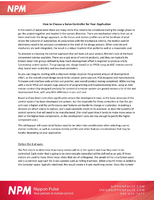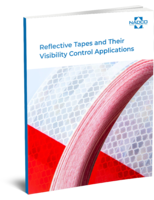Floating-Point DSP helps optimize audio performance.
Press Release Summary:
Running at 350 MHz, TMS320C6727B is built on C-efficient, VLIW architecture and features 32-bit external memory interface that provides 133 MHz SDRAM speed for handling more channels of audio to meet application requirements. Included dMAX DMA engine performs complex 1D, 2D, and 3D memory transfers, allowing DSP to be dedicated to signal processing tasks. Also available at 275 and 300 MHz speeds, DSP facilitates migration without requiring hardware design changes.
Original Press Release:
Texas Instruments Introduces its Highest Performing Floating-Point DSP
TMS320C6727 DSP Running at 350 MHz Empowers Customers to Transform High Resolution Audio Applications
HOUSTON, Feb. 28 -- Strengthening the foundation for the next generation of exciting sound experiences powered by digital signal processing technology, Texas Instruments Incorporated (NYSE:TXN) (TI) today announced the TMS320C6727B DSP, its highest performing floating-point DSP running at 350 MHz. Available today, the C6727B DSP is tuned for performance hungry applications for which a significant speed increase will impact OEM's ability to create unique and advanced product offerings, including high quality audio conferencing, multi-channel audio systems, audio broadcast biometric and industrial solutions. TI's floating-point DSP portfolio, including the C6727B DSP, is based on the TMS320C67x+ DSP generation-based core, a C-efficient, VLIW architecture that offers significant application performance improvements. For more information, please visit www.ti.com/c6727pr .
Running at 350 MHz, the C6727B DSP strengthens TI's investment in providing customers a complete list of multi-speed offerings of its floating- point DSP platform, allowing them the ability to transform products that require superior audio performance. The C6727B DSP is also available at speeds of 275 MHz and 300 MHz, giving developers the flexibility to seamlessly migrate to 350 MHz without changing the hardware on their design.
Additionally, since the C6727 DSP is fully code compatible with TI's scaleable family of floating-point DSPs, the TMS320C6720, TMS320C6722B and TMS320C6726B DSPs, developers can easily migrate to the C6727B DSP, taking immediate advantage of the boosted performance without requiring any additional investment in hardware or software engineering, saving development cost and time. Customers can leverage TI's extensive floating-point DSP portfolio to select the ideal DSP architecture to meet their precise needs for a myriad of products.
For extended flexibility and expansion, the C6727B has a 32-bit external memory interface (EMIF) that provides a 33 percent increase in SDRAM speed from 100 MHz to 133 MHz. This allows the DSP to handle significantly more channels of audio so developers can meet the processing requirements in their tailored audio flagship applications, such as professional audio mixer and active noise-cancellation systems. The device also features the dMAX DMA engine which significantly improves system performance by performing complex 1-D, 2-D and 3-D memory transfers allowing the DSP to be dedicated to signal processing tasks.
"We are continuously developing and thus evolving our state of the art active noise cancellation (ANC) systems. Implementing our latest ideas takes minimal time on the C672x platform since we can do most of our software development in C," said Harry Bachmann, CEO of Anocsys AG, the world's first company who offers custom made ANC solutions for home applications. "With the additional performance available on the C6727B-350, we will be able to implement even more complex technologies into our products."
Comprehensive Array of Tools and Hardware
Customers have several options when kick starting a C672x based project. First is the Professional Audio Development Kit (PADK), a hardware/software solution that includes audio effects processing, demo application and framework. Developers can use this demo application to build their own applications in an extremely short time. In addition to the PADK, developers can take advantage of the schematics, logic equations and application notes included in the low cost DSP-Weuffen C6727 DSP evaluation module (EVM) from DSP-Wueffen GmBH. Users can immediately start evaluation with the compact EVM, which includes SDRAM, flash, audio codecs and peripheral connectors that extends the board to application specific hardware.
"The DSP-Weuffen C6727-EVM has been very successful with floating point DSP customers from a wide range of application spaces," said Dieter Weuffen, CEO at DSP-Weuffen. "Launching of the C6727B-350 will make our development tools even more attractive to the customers looking for more processing power."
The C6727 is a part of TI's overall commitment to the high performance audio market. Combined with a broad analog portfolio of industry-leading data converters, S/PDIF transceivers, sample rate converters and programmable amplifiers, the C6727 completes TI's offering of the highest performing audio signal chain available today. To learn more about TI's audio products, please visit www.ti.com/audio .
Price and Availability
TMS320C6727 DSPs are sampling immediately. The C6727B DSP is available at 275 MHz, 300 MHz and 350 MHz and is priced at $16.75, $19.95 and $25.95 respectively. The PADK (TMDXPDK6727) also is available now from Texas Instruments at $1995. The DSP-Weuffen C6727 EVM is available from DSP-Weuffen at www.dsp-weuffen.de/ .
About Texas Instruments
Texas Instruments Incorporated provides innovative DSP and analog technologies to meet our customers' real-world signal processing requirements. In addition to Semiconductors, the company's businesses include Sensors & Controls, and Educational & Productivity Solutions. TI is headquartered in Dallas, Texas, and has manufacturing, design or sales operations in more than 25 countries.
Texas Instruments is traded on the New York Stock Exchange under the symbol TXN. More information is located on the World Wide Web at www.ti.com/ .
Trademarks
TMS320C67x and C67x are trademarks of Texas Instruments. All other trademarks and registered trademarks are the property of their respective owners.




